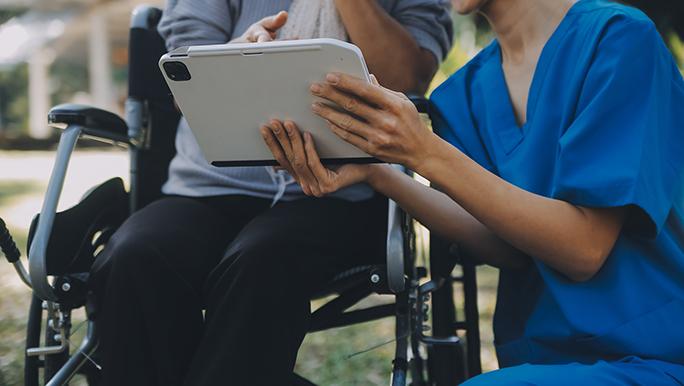Actor-centred integration of digital assistance systems into processes, organisations, and living environments in outpatient care for the elderly (AIDA)

With the AIDA project (Actor-centred integration of digital assistance systems into processes, organisations, and living environments in outpatient care for the elderly), the Protestant University of Applied Sciences (EvH) is helping to make the lives of older people more liveable, tackle challenges such as the increasing need for care and the shortage of nursing staff, and reduce the risks of exclusion for those in need of care. The project is led by Prof Dr Roland Schöttler and Prof Dr Andrea Kuhlmann.
Challenge
Our everyday lives are getting ever smarter: vacuum and floor mopping robots clean the home, heating, lighting, and roller shutters can be controlled via an app while we are out and about, and room monitoring systems report unwanted movements in our own homes to our smartphones. However, most technological developments are aimed at the younger generation, although digitalisation could offer enormous benefits to older people and enable them to stay in their own homes for as long as possible. The potential solutions offered by digital assistance systems have not yet been utilised. However, intensive research into the development of digital aids for outpatient care has been going on for several years and suitable, affordable technologies are available. So far, their use has mostly failed due to conflicts between ethical, professional, technological, economic, and political considerations.
Goals and procedure
The AIDA project aims to analyse the possibilities and benefits of sensor-based assistance systems in outpatient care and to scientifically monitor their use over a longer period. The project team wants to find out how these systems can be integrated into outpatient care and thus into the living environment of older people in such a way that all stakeholder groups – people with care needs, care staff, and care organisations – benefit from them. The project will develop innovative solutions for technically supported outpatient care and thus close the gaps between the possibilities and practical use of technical assistance systems. If this is successful, social economy organisations and technology providers will have a framework model for the sustainable and user-oriented development, introduction, and application of digital assistance systems that will enable older people to live as independently as possible and control care processes with data support.
Innovations and perspectives
The central innovation of this participatory, transdisciplinary, and practice-oriented research project is the integration of digital assistance systems into processes and organisations in outpatient care with a strong focus on the benefits. While idea development and prototyping have been researched many times, the practical application possibilities for the outpatient care process have hardly been worked out so far. This project scientifically evaluates both the implementation and the way in which the involved parties handle and utilise the technology. The resulting framework model significantly increases the likelihood that the systems will be used regularly, as it is based on the development of products and services strictly oriented towards benefit. In addition to the stakeholder groups involved, the university and its students also benefit from the project results, as digital expertise can be expanded and directly integrated into teaching.